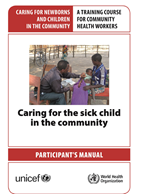Care for sick children in the community
Coverage of interventions to help children survive and thrive is often lowest where the needs are greatest. This means that many newborns and children, especially in low- and middle-income countries, still do not have access to curative or preventive health care. Recognizing that services need to be brought closer to home, a simplified version of IMCI was developed to be used by lay community health workers.
In this process, also known as "Community Case Management" (CCM) the community health worker:
- identifies and refers children with danger signs to a health facility;
- treats (or refers) pneumonia, diarrhoea and fever;
- identifies and refers children with severe malnutrition;
- refers children with other problems that need medical attention; and advises on home care for all sick children.
The selected interventions require the availability and use of four simple medicines: an antibiotic (usually amoxicillin), an antimalarial, oral rehydration salts (ORS) and zinc tablets.
Families are on the front line of care for their children, and they also need supportive skills, encouragement and confidence to care for their children.
Integrated community case management - Training material

Caring for the sick child in the community
These materials are designed to help lay community health workers (CHW) assess and treat sick children age 2 - 59 months. In this process, also known as...
Policy briefs and implementation resources

Strengthening the capacity of community health workers to deliver care for sexual, reproductive, maternal,...
Government institutions, United Nations agencies, and global partners have been repositioning the role that community health workers (CHWs) can play in...

Severe malnutrition is a life threatening condition requiring urgent treatment. Until recently, the recommendation was to refer these children to hospital...

Management of sick children by community health workers: Intervention models and programme examples
Millions of children under five years of age are still dying each year from preventable or treatable diseases. Many of these deaths could be prevented...

Management of pneumonia in community settings
Pneumonia remains a major killer of children under five years of age. The best way to reduce deaths from pneumonia is to provide prompt and effective treatment....

Child health in the community - "Community IMCI" : Briefing package for facilitators
Community-based activities are ongoing in many communities in most countries. This Briefing Package proposes a process for bringing principal partners...

This brief document aims to initiate, reinforce and sustain family practices that are important for child survival, growth and development. The other components...

An equity-focused strategy to improve access to essential treatment services for children
This statement presents the latest evidence for integrated community case management (iCCM) of childhood illness, describes the necessary programme elements...

